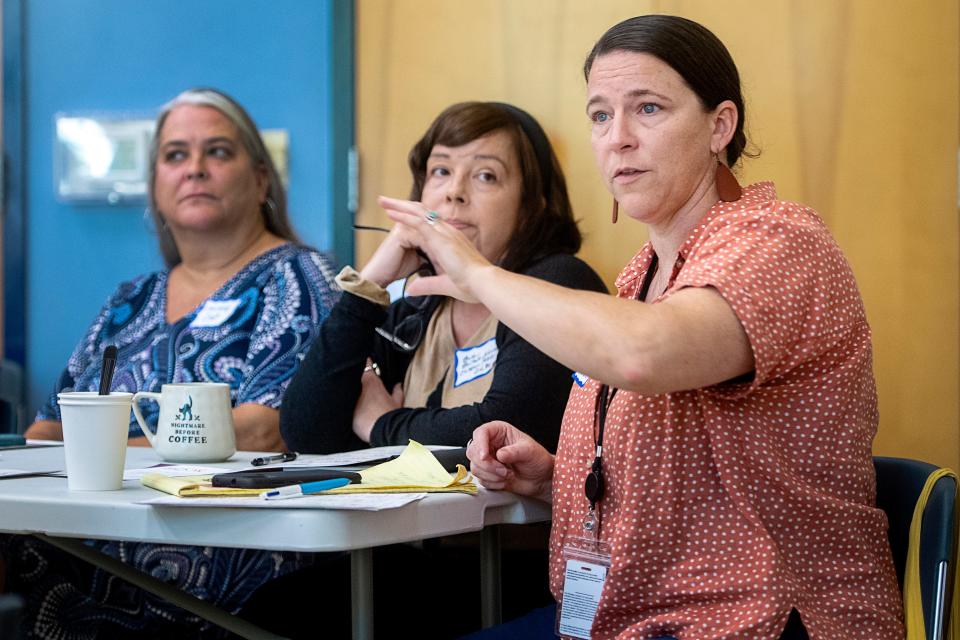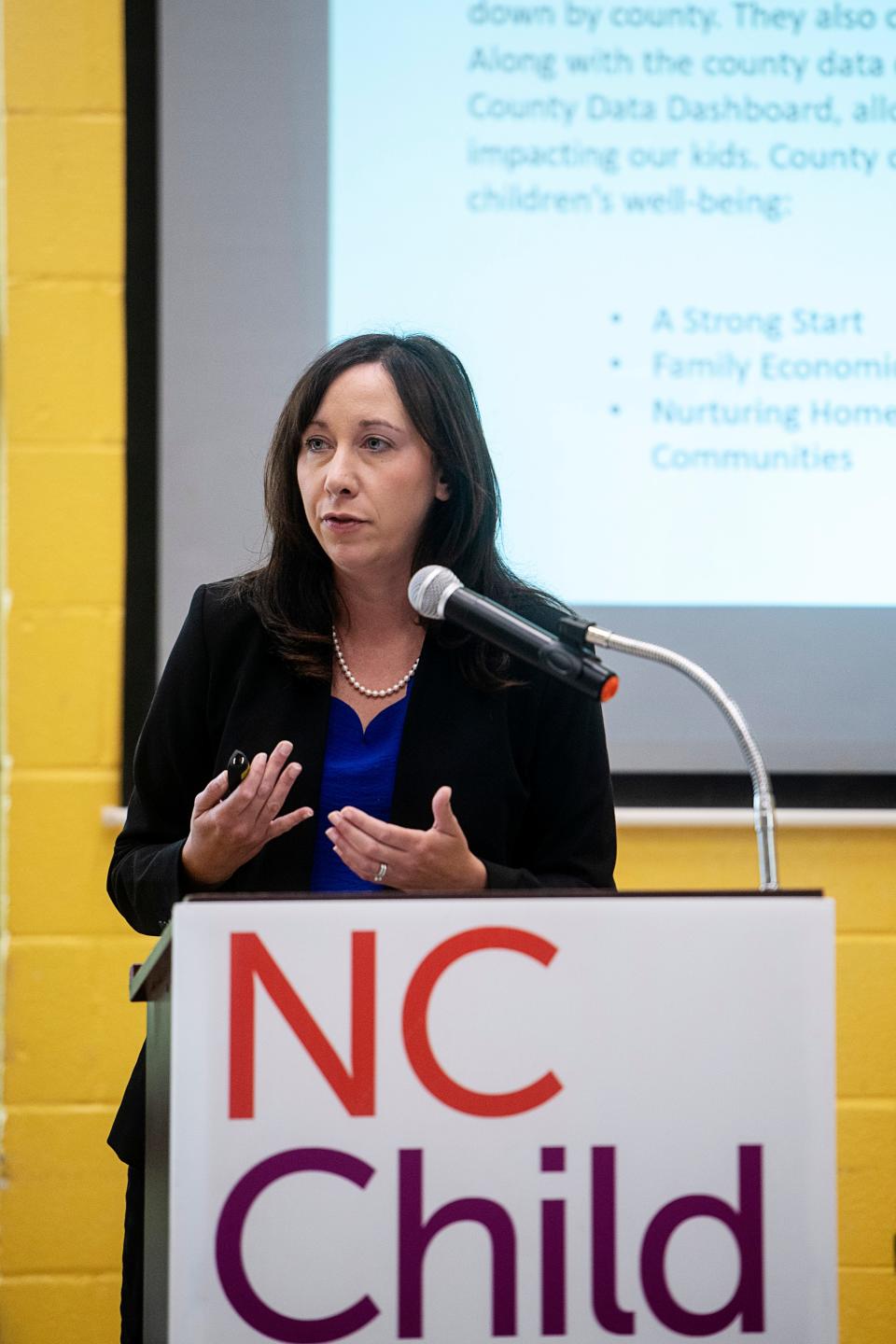What is Buncombe County NC Child data on health, food insecurity, reading, family income?
ASHEVILLE- Jessica Edwards had to drive 12 hours each time she wanted to visit her daughter, who was in recovery for substance use.
Edwards drove all the way to Alabama from her home in Buncombe County because there were no resources available in North Carolina to get her daughter help, she said.
"I do resource work. That's my job. I help other families find resources," Edwards said, frustrated that she was unable to help her own family due to the lack of support in the state.
Edwards was one of dozens of community members and advocates for youth gathered at the Asheville YWCA on Sept. 13 to talk about just that — how to create more resources and support for youth across counties in Western North Carolina.

NC Child, a nonprofit that hosted the event, helps to advance public policies to support children. Every year since 2018 the organization has been producing "county data cards" that provide local snapshots of child well-being to communities.
NC Child Executive Director Erica Palmer Smith presented the 2023 county data card and its implications for children in North Carolina.
County data cards look at five key indicators in areas of children’s well-being including: a strong start (the start of a child's life); family economic security; nurturing homes and communities; health and wellness; and a high-quality education.
While the 2023 data card was presented, most of the statistics are from 2021 and some from 2022.
In comparison to the state, Buncombe County has about a 2% higher rate for third graders who score proficient in reading, around 4% higher than the state graduation rate and almost 10% higher than state residents with a bachelor's degree or higher.

Buncombe County 2023 data card
There are 60,002 children who live in Buncombe County, around 13,800 are under the age of 6.
A strong start
88.4%: Women who receive early prenatal care.
8.4%: Babies born at a low birthweight.
11%: Babies born pre-term.
Family economic security
38%: Children living in poor or low-income homes.
11.8%: Children in households that are food insecure.
$59,699: Median family income.
Nurturing homes and communities
11.1: Delinquency rate per 1,000 youth ages 6-15.
56.1: Children assessed for abuse or neglect per 1,000.
5.6: Teen births per 1,000 girls ages 15-17.
High-quality education
48.2%: Third grade students scoring proficient in reading.
90.4%: High school students graduating on time.
42.3%: Residents with a bachelor's degree or higher.
More: Asheville City, Buncombe County schools performance grades are in for 2022-23 year
Health and wellness
5.3% Children without health insurance.
4.5: Infant mortality per 1,000 live births.
Trends over the years
Since the 2019 data card, third-grade students who are scoring proficient in reading has dropped 13.4%.
Residents who have a bachelor's degree or higher has gone up 11% since 2021.
Children in households that are food insecure have decreased 7.8% since 2019, when almost 20% of children living in households in Buncombe County were food insecure.
Since 2019 children without health insurance has increased 1.5%.
The delinquency rate went down from 16.8 per 1,000 youths ages 6-15 in 2021 to 11.1 per 1,000 this year.
More: Which Asheville-area schools offer all students free meals? Which does not and why?
Family economic security has been improving since 2019. The median family income is at its highest, taking into consideration that the cost of living has risen.
The living wage in Buncombe County is $20.10 an hour. The new living wage was announced March 1 by the nonprofit Just Economics of WNC, a huge 14% jump from the 2022 rate of $17.70 an hour. Annually, the $20.10 would come to $41,800.
"We saw improvements in economic indicators because we saw improvements in economic support," Smith said.

"We saw those COVID relief funds allow families to come out of poverty. We saw families stay out of poverty, and we saw them entirely lifted out in these counties during that timeframe. That isn't something we necessarily anticipate to stay the same on future cards when we have updated numbers post 2021."
Drew Christy, the director at Democratic Gov. Roy Cooper's western office chimed into the conversation on Sept. 13 assuring community members that Cooper allocated more than $500 million for school social workers in his recommended budget back in March.
"The governor is working hard to make sure that these children have the tools that they need, and the parents have the tools they need," Christy said.
Youth mental health crisis
Smith said an area that's not reflected in the indicators but deeply tied into it is the youth mental health crisis.
Data in NC Child's presentation said that 1 in 5 North Carolina high school students reported seriously considering attempting suicide in 2021, which is up from 16% in 2017, and 1 in 10 reported actually making an attempt.
Smith said that the suicide rate was an issue even before 2020.
Other members of the audience pointed to social media as a cause of the high suicide rates and the lack of emotional resources for children and parents.
Community member, Susanne Walker Wilson, talked about the importance of helping children regulate their emotions.
"Our state continues to invest almost all of its parenting funding in things that don't support the relational work between parents and children," Wilson said.
More: Asheville-area Democratic leaders call out state GOP on threats to public education
More: Without NC funding, child care workers in Asheville, Buncombe could see big pay cuts
McKenna Leavens is the education reporter for the Asheville Citizen Times, part of the USA Today Network. Email her at mleavens@citizentimes.com or follow her on Twitter @LeavensMcKennna. Please support this type of journalism with a subscription to the Citizen Times.
This article originally appeared on Asheville Citizen Times: NC Child talks about the youth mental health crisis, what can we do

